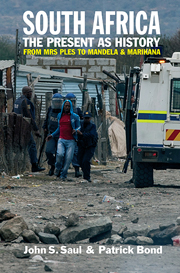Book contents
- Frontmatter
- Dedication
- Contents
- Introduction: South Africa in History
- Part I What's Past is Prologue: From the Beginnings to 1994
- 1 The Making of South Africa … and Apartheid, to 1970
- 2 The Transition: The Players Assemble, 1970–1990
- 3 The Apartheid Endgame, 1990–1994
- Part II The Present as History: Post-Apartheid and Post-1994
- Part III Conclusions: The Future as History
- Bibliography
- Index
2 - The Transition: The Players Assemble, 1970–1990
from Part I - What's Past is Prologue: From the Beginnings to 1994
Published online by Cambridge University Press: 05 December 2015
- Frontmatter
- Dedication
- Contents
- Introduction: South Africa in History
- Part I What's Past is Prologue: From the Beginnings to 1994
- 1 The Making of South Africa … and Apartheid, to 1970
- 2 The Transition: The Players Assemble, 1970–1990
- 3 The Apartheid Endgame, 1990–1994
- Part II The Present as History: Post-Apartheid and Post-1994
- Part III Conclusions: The Future as History
- Bibliography
- Index
Summary
The present chapter, and the briefer but complementary one that follows it, tell a complex story. On the one hand, they chart the slow but ineluctable struggle on the part of the vast majority of the population, who were, by and large, not white, to overcome the cruel ‘pigmentocracy’ – as finally epitomized by the apartheid regime – that had come to dominate their lives and stunt their human potential. At the same time, however, the enemies of promise were many more than those embedded in the fact of racial rule itself. For, as seen in the previous chapter, there was also, linked to and interpenetrating with white rule, the grim fact of capitalist domination. Indeed, for many South Africans, the struggle for racial freedom and equality was simultaneously a struggle for freedom from class and external economic domination – and also one for gender equality, environmental security and the institutionalization of democratic structures within which the voices of all could be heard and heeded. Yet the fact remains that the struggle for racial equality – in part eminently successful – has been far more fully realized than have been any struggles for class, gender and environmental justice and for the guaranteeing of any meaningful and effective democratic ‘voice’ for all citizens.
In short, there can be no question that the victory over the grim system of apartheid, recorded in this chapter, was dramatic.
- Type
- Chapter
- Information
- South Africa - The Present as HistoryFrom Mrs Ples to Mandela and Marikana, pp. 63 - 120Publisher: Boydell & BrewerPrint publication year: 2014



